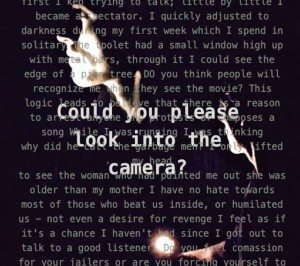
 Syrian playwright and Applied Theatre practitioner Mohammad Al Attar launches a peaceful yet potent attack. His enemy is the world’s apathetic tendencies towards human suffering in the contentious Middle East. His weapon is the theatre.
Syrian playwright and Applied Theatre practitioner Mohammad Al Attar launches a peaceful yet potent attack. His enemy is the world’s apathetic tendencies towards human suffering in the contentious Middle East. His weapon is the theatre.
In Could You Please Look Into the Camera?, a play presented by Between the Seas Festival at Theaterlab, Mohammad Al Attar shines his spotlight on the horrifying imprisonment Syria’s innocent people endure by their leader, President Assad. We hear from three now-freed prisoners and the altruistic filmmaker who reaches out to these victims to offer an ear and an eye into their horrors.
So, how does a theatre practitioner tell this story of hell with art and virtue? Director Aktina Stathaki admits that she is still grappling with this question. She is quoted in the program, “This performance is part of an ongoing artistic exploration of testimony in performance: how do we stage stories of collective trauma and memory in a manner that does justice to the material…at the same time has aesthetic and theatrical merit?” The answer is to keep exploring. When it doesn’t work, be comforted in the journey. Then, try again. This is the unenviable task of the conscience-theatre creator. It will come with successes and failures, to be sure.
Here are the successes: Noura (filmmaker) is played by Greek-born actress Theodora Loukas with sensitivity and vulnerability. In a constant state of powerless reaction, she reflects the rest of humanity. Through Loukas’ delicate artistry, Noura gives the audience a voice in this conversation. She embodies the awkward embarrassment we feel for having never endured such torture while trying to relate to people who have.
Here are the failures: actual video footage, as well as actor-in-character filmed testimony, was projected onto the walls of the Theaterlab’s white-box theatre. The projections are such an interesting part of the staging but the jagged walls got in the way of projection. This matters when you want to read the subtitles of a Syrian child speaking. It is a small but potentially powerful moment which is lost all because of a jagged wall.
More distracting, the actors speak in schizophrenic, loud whispers or hum audibly while the footage rolls. One doesn’t know where to put one’s attention. The result is a lack of empathy for the story told because it wasn’t clearly heard. The monologue-dialogue between the filmmaker and the individual victims is overcrowded with words. The words and whispers seem to never cease, and both rarely give way to raw and honest emotion.
In theatre, you never remember what you hear. You only remember what you see. The creative minds behind Could You Please Look Into the Camera? would do the play a big favor by not relying so heavily on the spoken word as its main theatrical convention. This creation offers us audience members the chance to glimpse inside a world so in need of meaningful compassion. We want our hearts to burst wide open. We need you, the storyteller, to keep looking for the most powerful way to tell this story.